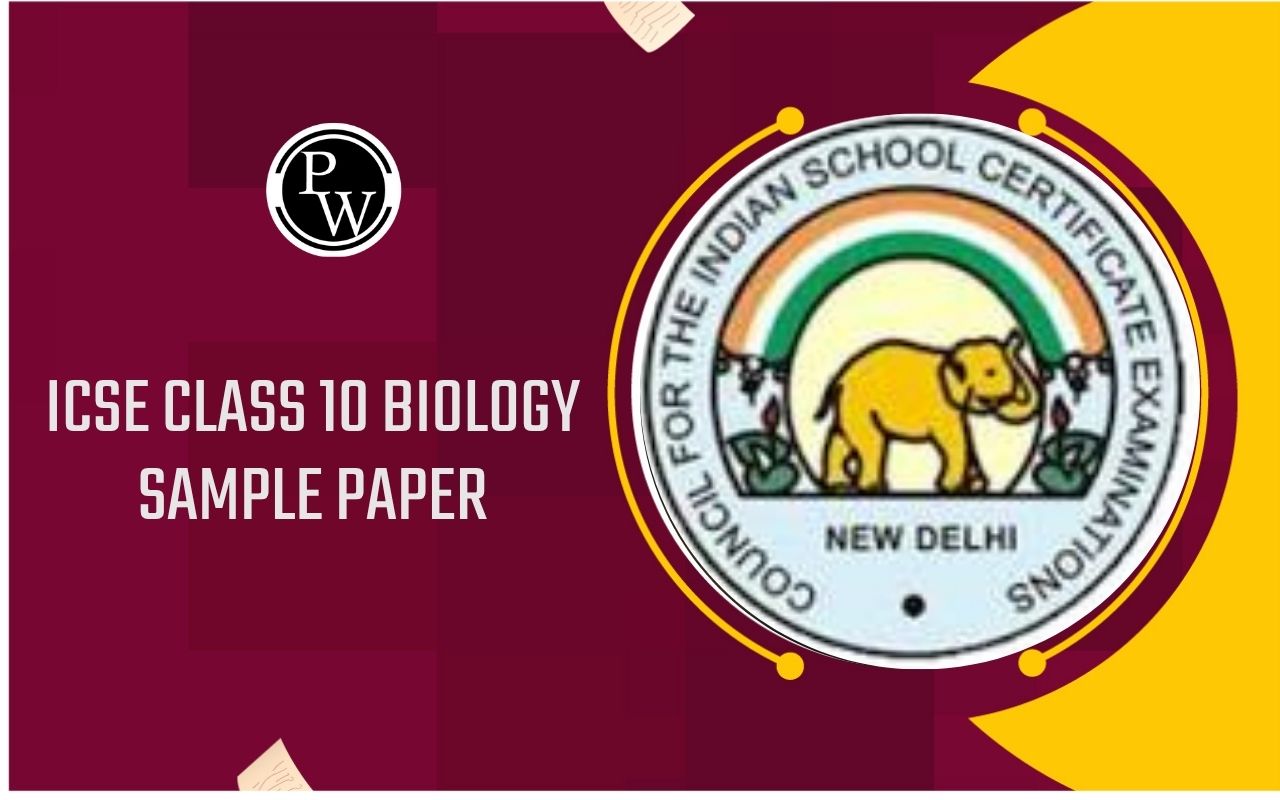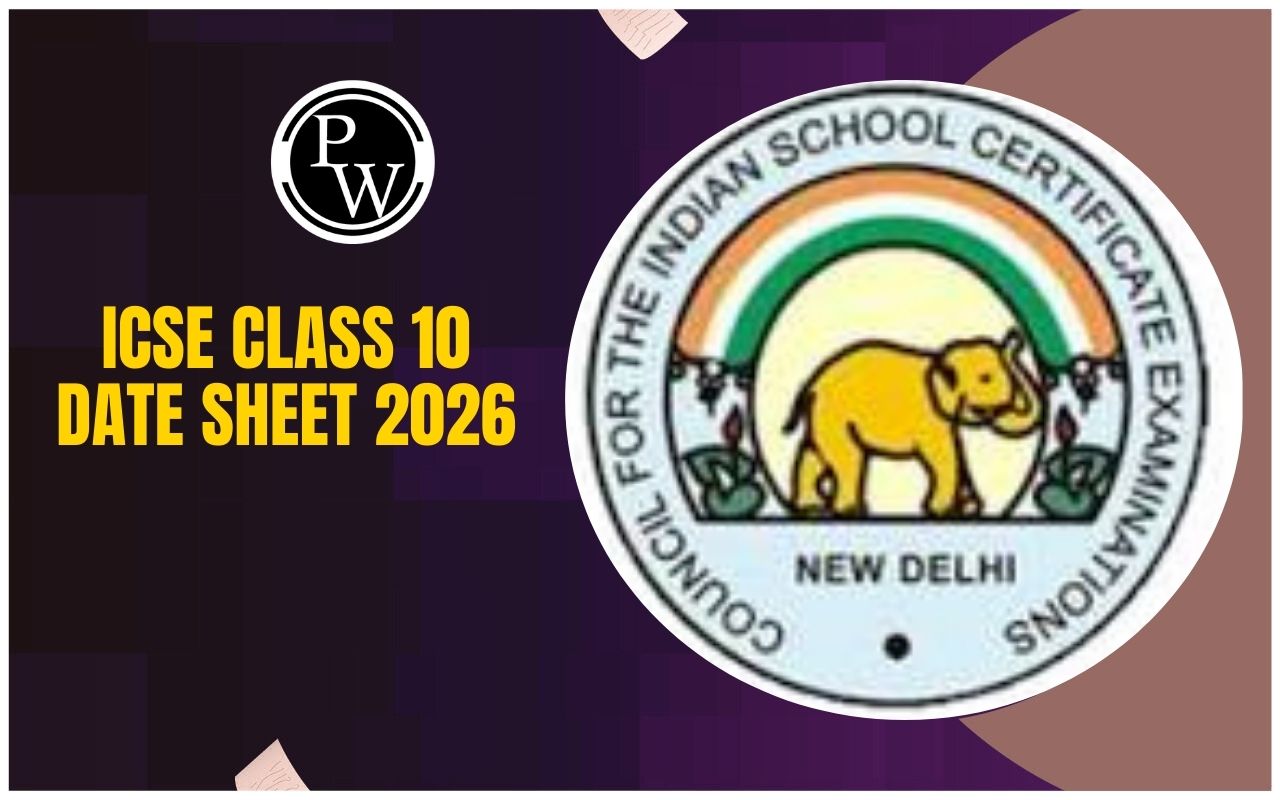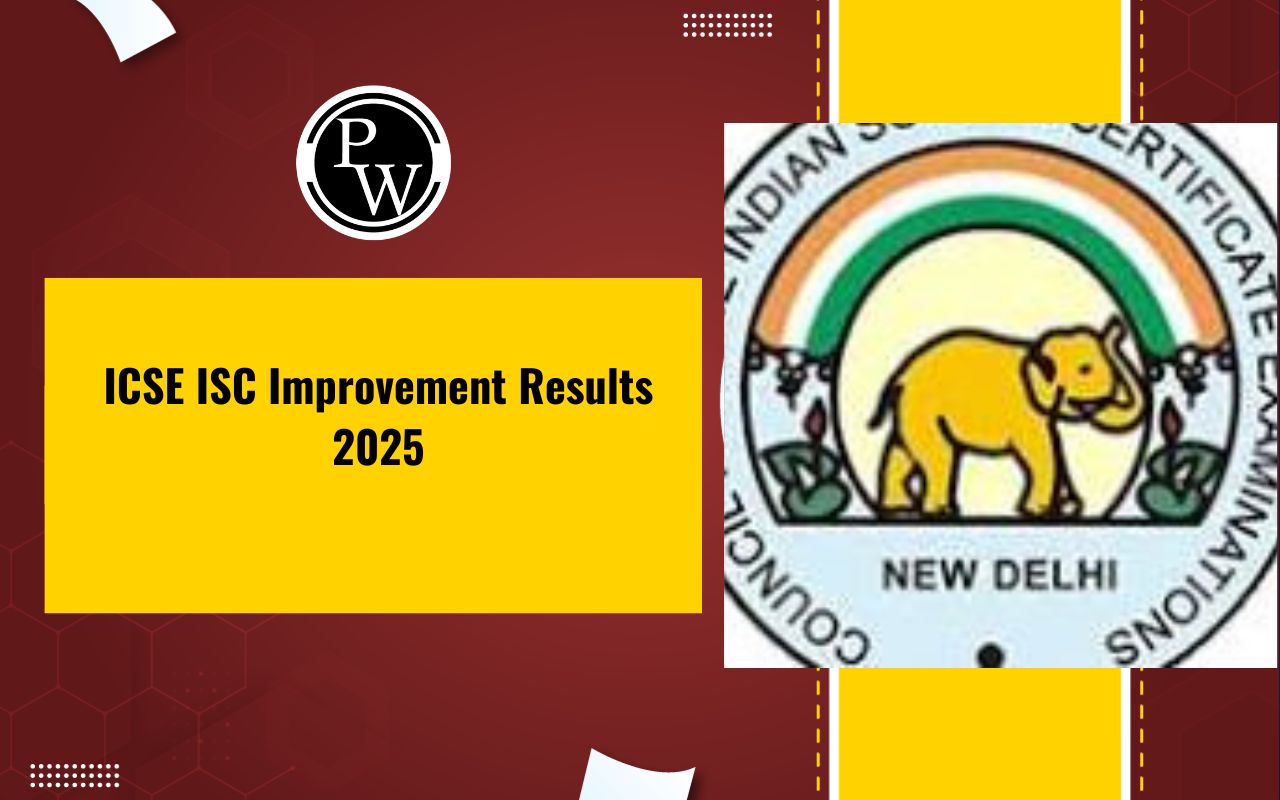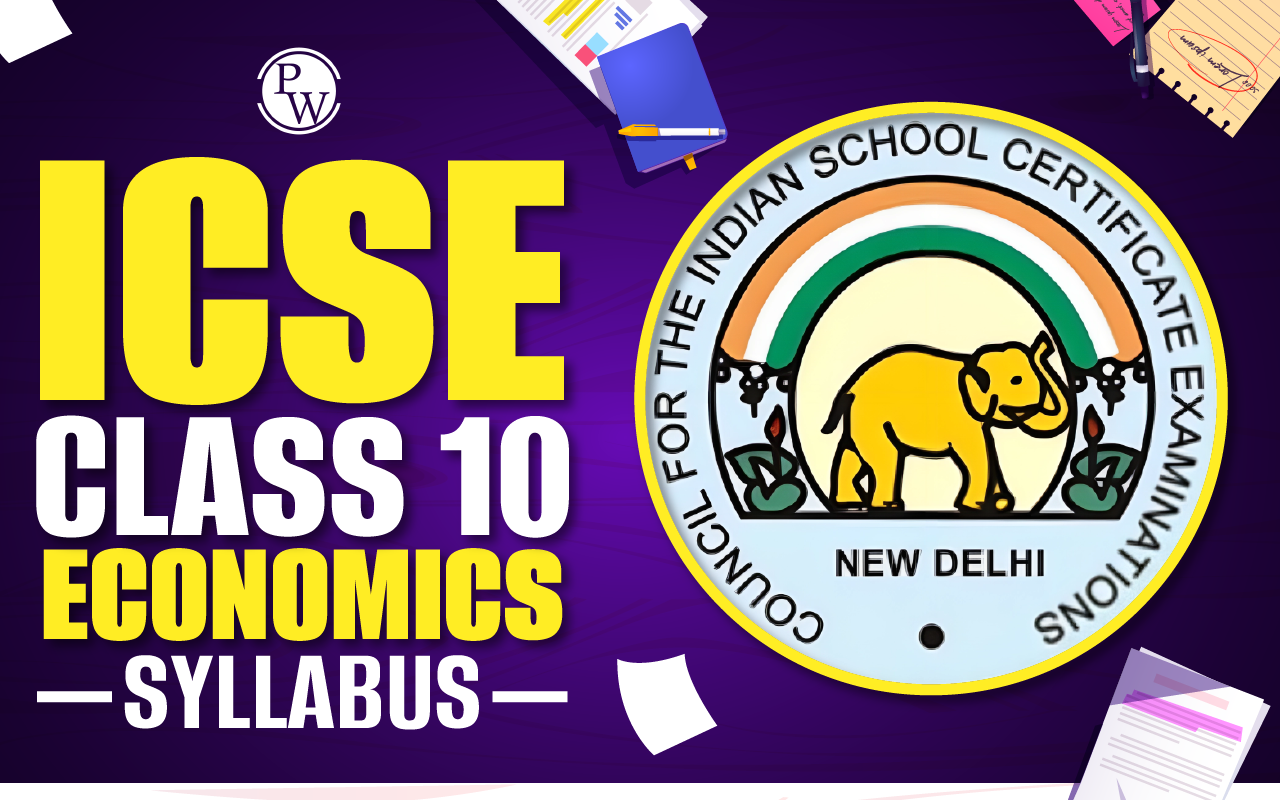
ICSE Class 10 Geography Syllabus: The ICSE Class 10 Geography Syllabus for 2023-24 is designed to provide a well-rounded understanding of geographical concepts, focusing on theoretical knowledge and practical map-reading skills.
Part 1 focuses on topographical maps and maps of India, where students must mark major geographical features such as mountains, plains, rivers, and more. This section is designed to assess students' map-reading and interpretation skills. Part 2 of the syllabus comprises 10 chapters that delve into various aspects of the Geography of India. The evaluation process includes a written paper with 80 marks and an internal assessment with 20 marks. This comprehensive assessment aims to gauge students' knowledge and skills.ICSE Class 10 Biology Syllabus
Throughout the course, students are encouraged to employ visual aids such as sketches, diagrams, graphs, and charts to enhance their answers and present information effectively. Moreover, the examination may feature questions that necessitate the interpretation of photographs related to geographical interests, emphasizing a visual approach to learning Geography.ICSE Class 10 Geography Syllabus 2023-24 Overview
The ICSE Class 10 Geography syllabus for the academic year 2023-24 encompasses a comprehensive study of geographical concepts, phenomena, and global issues. Geography is crucial in helping students understand the dynamic interactions between human societies and the environment. The syllabus is designed to enhance students' knowledge of diverse geographical features, climatic patterns, and socio-economic aspects across the globe. The syllabus also covers the concept of natural resources, emphasizing their sustainable management.ICSE Class 10 History and Civics Syllabus
ICSE Class 10 Geography Syllabus 2023-24 PDF
The PDF of the ICSE Class 10 Geography Syllabus for the academic year 2023-24 is now accessible on the official CISCE website. To initiate their studies, Students can download the ICSE Class 10 Geography Syllabus 2023-24 PDF from the official website. To facilitate easy access for students, a direct link to download the ICSE Geography Syllabus for Class 10 for the year 2023-24 is also provided below.ICSE Class 10 Geography Syllabus 2023-24 PDF Link
ICSE Class 10 Geography Syllabus Chapter Wise
ICSE Class 10 Geography Syllabus for the academic year 2023-24 is categorized into Part I - Map Work and Part II - Geography of India.Part I - Map Work
In this section, students will interpret topographical maps, including locating features using grid references, understanding contours and contour intervals, interpreting color tints and conventional symbols, and identifying the types of scales on maps. They will also mark directions, recognize natural and man-made features, and interpret site features of villages and towns. Additionally, students will work on a map of India, marking and naming various geographical features such as mountains, plateaus, plains, rivers, water bodies, passes, latitudes, longitudes, wind directions, mineral distribution, soil types, cities, and population distribution.ICSE Class 10 Economics Syllabus
1. Interpretation of Topographical Maps:
- Locating features using a four-figure or six-figure grid reference.
- Definition of contour and contour interval. Identification of landforms marked by contours, such as steep slope, gentle slope, hill, valley, ridge/water divide, and escarpment. Also, understanding triangulated height, spot height, benchmark, and relative height/depth.
- Interpretation of color tints and conventional symbols on a topographical survey map of India.
- Identification and definition of types of scale on the map. Measuring distances and calculating area using the provided scale.
- Marking directions between different locations, using eight cardinal points.
- Identifying the site of prominent villages and/or towns, types of land use/land cover, and means of communication with the help of the index provided at the bottom of the sheet.
- Identification of drainage
- Identification of natural and man-made features.
2. Map of India:
-
On an outline map of India, candidates will locate, mark, and name the following geographical features:
- Mountains, Peaks, and Plateaus
- Plains
- Desert: Thar (The Great Indian Desert).
- Rivers
- Water Bodies
- Passes
- Latitude and Longitudes
- Direction of Winds
- Distribution of Minerals
- Soil Distribution – Alluvial, Laterite, Black and Red Soil.
Part II - Geography of India
This part comprises 10 chapters covering different aspects of India's geography:Chapter 1: Location, Extent, and Physical Features
- Position and Extent of India: Students will study India's geographical coordinates and boundaries.
- Physical Features: This includes an understanding of India's physical landscape, including mountains, plateaus, plains, and rivers.
Chapter 2: Climate
- Distribution of Temperature: Students will explore the temperature variations across different regions of India.
- Winds: Understanding the patterns of winds in summer and winter.
- Rainfall: Factors affecting rain, monsoons, and the seasonal variations in climate.
Chapter 3: Soil Resources
- Types of Soil: Study different soil types such as alluvial, black, red, and laterite.
- Distribution: Understanding the geographical distribution of each soil type.
- Characteristics: Examination of soil properties like texture, color, minerals, and associated crops.
- Soil Erosion: Causes, prevention, and conservation of soil erosion.
Chapter 4: Natural Vegetation
- Importance of Forests: Exploring the ecological significance of forests.
- Types of Vegetation: Understanding various vegetation types, including tropical evergreen, deciduous, desert, coastal, and mountain vegetation.
- Distribution: Correlating vegetation types with environmental conditions.
- Forest Conservation: The importance of preserving and protecting forests.
Chapter 5: Water Resources
- Sources of Water: Study of surface water and groundwater sources.
- Need for Conservation: Understanding the importance of water conservation.
- Conservation Practices: Exploration of practices like rainwater harvesting.
- Irrigation: Methods and significance of irrigation.
Chapter 6: Mineral and Energy Resources
- Minerals: Exploration of iron ore, manganese, copper, and their distribution.
- Conventional Sources of Energy: Study of coal, petroleum, and natural gas.
- Hydel Power: Focus on Bhakra Nangal Dam and Hirakud.
- Non-Conventional Sources: Exploration of solar, wind, nuclear, and biogas energy.
Chapter 7: Agriculture
- Indian Agriculture: Importance, problems, and reforms in the agricultural sector.
- Types of Farming: Understanding subsistence and commercial farming, including shifting, intensive, extensive, plantation, and mixed farming.
- Agricultural Seasons: Study of rabi, kharif, and zayad seasons.
- Crops: Examination of crops like rice, millet, wheat, pulses, sugarcane, oilseeds, cotton, jute, coffee, and tea.
Chapter 8: Manufacturing Industries
- Importance and Classification: Understanding industries' significance and classification into agro-based, mineral-based, and more.
- Agro-Based Industry: Focus on sugar and textile industries (cotton and silk).
- Mineral-Based Industry: Exploration of iron & steel, petrochemical, and electronics industries.
Chapter 9: Transport
- Importance: Understanding the significance of transportation.
- Modes of Transport: Exploration of roadways, railways, airways, and waterways.
- Advantages and Disadvantages: A study of the pros and cons of each mode of transport.
Chapter 10: Waste Management
- Need for Waste Management: Understanding the importance of effective waste management.
- Impact of Waste Accumulation: Examining the consequences of unchecked waste accumulation.
- Methods of Safe Disposal: Exploration of safe disposal methods, including segregation, dumping, and composting.
- Waste Reduction Strategies: Understanding and implementing strategies for reducing, reusing, and recycling waste.
ICSE Class 10 Geography Internal Assessment
ICSE Class 10 Geography Internal Assessment requires students to engage in project work based on suggested assignments or topics of their interest within specific areas:1) Local Geography:
- Analyze land use patterns in different regions of India.
- Compare land use patterns.
- Survey a local market to study the types of shops and services offered.
2) Environment:
- Study wildlife conservation efforts in India.
3) Current Geographical Issues:
- Investigate the development of tourism in India.
Transport in India:
- Explore the story of Road, Rail, Water, and Air routes.
5) Industries in the States:
- List different types of industries in various states of India.
- Gather information on types of raw materials, procurement methods, and waste disposal.
- Classify industries as polluting or environmentally friendly.
- Propose ways to reduce pollution caused by industries.
6) Industrialization in India:
- Examine the need for industrialization in India.
- Explore the latest trends and analyze their impact on the Indian economy.
7) Study of Waste Management Facilities:
- Visit a water treatment plant, sewage treatment plant, garbage dumping site, or vermicomposting site.
- Study the operations of these facilities.
ICSE Class 10 Geography Evaluation
- Assignments or project work will be evaluated by the subject teacher (internal examiner) and an external examiner.
- The external examiner, chosen by the Head of the School, preferably from the same faculty, will not teach the subject in the particular section/class.
- Each examiner will independently assess the assignments, awarding marks out of 10, totaling 20 marks.
- The Head of the School is responsible for submitting the total marks obtained to the Council through the online 'Careers' portal by the specified deadline.
ICSE Class 10 Geography Syllabus 2023-24 Exam Pattern
The ICSE Class 10 Geography exam will have a duration of 2 hours, and the question paper pattern is outlined as follows:| ICSE Class 10 Geography Syllabus 2023-24 Exam Pattern | |||
| Part | No. of Questions | No. of Questions to be Attempted | Marks |
| Part I | 2 | 2 (Both Compulsory) | 30 |
| Part II | Multiple | 5 | 50 |
Tips to Cover the ICSE Class 10 Geography Syllabus
Here are some tips to cover ICSE class 10 geography syllabus :- Focus on Key Topics: Prioritize key topics while covering the ICSE board Geography syllabus for class 10, as a significant portion of the questions is drawn from these areas.
- Select Proper Study Location: Choose a suitable study location with minimal distractions to concentrate on the task while completing the Geography ICSE syllabus for class 10.
- Break into Small Chunks: Instead of tackling large portions of the Geography syllabus for ICSE class 10 at once, break down topics into smaller, more manageable chunks. This approach aids in better retention, even for complex subjects.
- Prepare a Timetable: Create a well-structured timetable to manage time effectively while covering the geography syllabus for ICSE class 10, especially if there are time constraints. This ensures a systematic approach to completing topics.
- Prepare Notes: Take comprehensive notes encompassing definitions, elaborations, and essential concepts while covering the class 10 Geography syllabus for ICSE. These notes can be invaluable during revision and assessments. Additionally, students can utilize class 10 Geography notes available.
- Keep Important Things: Keep essential study materials, such as a laptop, reference books, notebooks, etc., within reach while covering the Geography syllabus for ICSE class 10. Conversely, eliminate potential distractions from the study environment to enhance focus and productivity.
ICSE Class 10 Geography Syllabus FAQs
What is the ICSE Class 10 Geography syllabus?
The ICSE Class 10 Geography syllabus covers diverse topics, including studying regions, climatic conditions, natural resources, and human activities. It aims to give students a comprehensive understanding of geographical concepts and phenomena.
How can students prepare for the ICSE Class 10 Geography exam?
Effective preparation involves understanding key concepts, regularly revising sample papers, and practicing map-related questions. Use textbooks like Physics Wallah, reference materials, and online resources to enhance understanding.
Are there practical components in the Geography syllabus?
While there isn't a practical exam, map work is essential. Students are expected to practice map-related questions, including identifying features and locations.
How are marks distributed in the ICSE Class 10 Geography exam?
Marks are generally distributed among theory questions, maps, and project work. Students should be well-versed in both theoretical concepts and practical aspects.
Is project work a mandatory part of the Geography syllabus?
Yes, project work is a crucial part of the ICSE Class 10 Geography syllabus. It involves research, data collection, and analysis of geographical aspects, enhancing students' research and presentation skills.
Talk to a counsellorHave doubts? Our support team will be happy to assist you!

Free Learning Resources
PW Books
Notes (Class 10-12)
PW Study Materials
Notes (Class 6-9)
Ncert Solutions
Govt Exams
Class 6th to 12th Online Courses
Govt Job Exams Courses
UPSC Coaching
Defence Exam Coaching
Gate Exam Coaching
Other Exams
Know about Physics Wallah
Physics Wallah is an Indian edtech platform that provides accessible & comprehensive learning experiences to students from Class 6th to postgraduate level. We also provide extensive NCERT solutions, sample paper, NEET, JEE Mains, BITSAT previous year papers & more such resources to students. Physics Wallah also caters to over 3.5 million registered students and over 78 lakh+ Youtube subscribers with 4.8 rating on its app.
We Stand Out because
We provide students with intensive courses with India’s qualified & experienced faculties & mentors. PW strives to make the learning experience comprehensive and accessible for students of all sections of society. We believe in empowering every single student who couldn't dream of a good career in engineering and medical field earlier.
Our Key Focus Areas
Physics Wallah's main focus is to make the learning experience as economical as possible for all students. With our affordable courses like Lakshya, Udaan and Arjuna and many others, we have been able to provide a platform for lakhs of aspirants. From providing Chemistry, Maths, Physics formula to giving e-books of eminent authors like RD Sharma, RS Aggarwal and Lakhmir Singh, PW focuses on every single student's need for preparation.
What Makes Us Different
Physics Wallah strives to develop a comprehensive pedagogical structure for students, where they get a state-of-the-art learning experience with study material and resources. Apart from catering students preparing for JEE Mains and NEET, PW also provides study material for each state board like Uttar Pradesh, Bihar, and others
Copyright © 2026 Physicswallah Limited All rights reserved.









